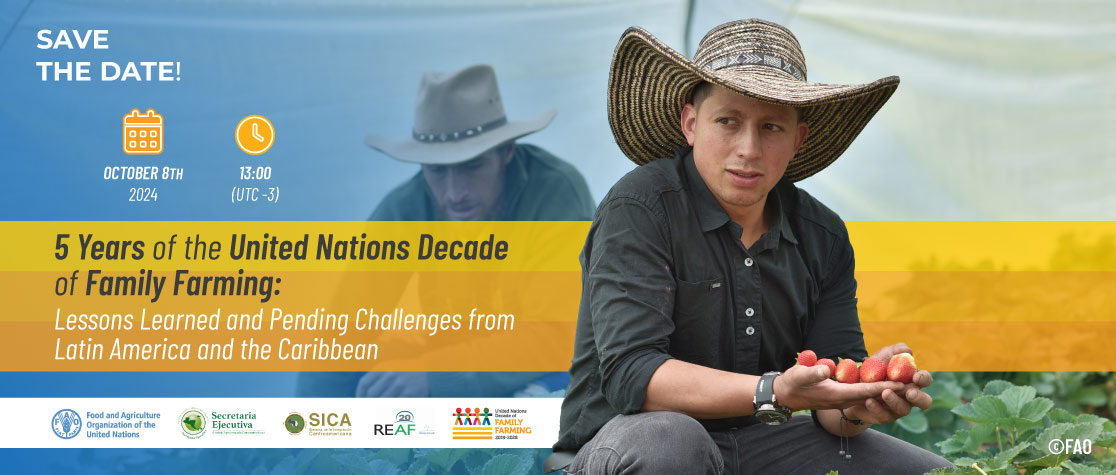Five Years of the United Nations Decade of Family Farming: Lessons Learned and Pending Challenges from Latin America and the Caribbean
Virtual Event, 08/10/2024

Background
In 2019, the United Nations General Assembly proclaimed the United Nations Decade of Family Farming (UNDFF) 2019-2028, recognizing the crucial importance of family farming in eradicating hunger, reducing poverty, and promoting sustainable food systems. Five years after this proclamation, it is time to reflect on the progress made, the challenges that persist, and the future opportunities to strengthen rural communities and small farmers, who are the heart of family farming.
In Latin America and the Caribbean, family farming plays a fundamental role not only in food production but also in preserving biodiversity, culture, and rural traditions. Therefore, the Food and Agriculture Organization of the United Nations (FAO) Regional Office, in collaboration with the Central American Integration System through the Central American Agricultural Council, the Specialized Meeting on Family Farming of MERCOSUR (REAF/MERCOSUR), and family producer organizations, has promoted a series of actions in favor of this sector, in line with global, regional, and national action plans.
Since the Regional Launch of the Decade in 2019, the region has seen significant progress in designing differentiated policies that facilitate family farming's access to better conditions for social, economic, and political inclusion. Likewise, the sector's contribution to addressing the challenges posed by an inclusive and sustainable rural transformation agenda has been highlighted, ensuring that no one is left behind, particularly through the exchange of experiences and the development of tools that promote the circulation of ideas, such as the Regional Technical Platform for Family Farming, facilitated by the FAO Regional Office.
However, despite its importance and the advancements made, family farming in Latin America continues to face significant challenges in enhancing its transformative and innovative capacity, as well as limited access to financial, technological, and market resources, alongside increasing pressure from inequalities and climate change. This situation is reflected in the Santiago Charter, produced in Chile in 2022, which outlines a cooperation agenda to guide actions for the next five years of UNDFF implementation.
Thus, this event is organized as part of the commemoration of the fifth anniversary of the Decade, with the aim of bringing together key stakeholders, sharing experiences, and analyzing effective strategies that have contributed to improving the lives of rural families, in preparation for the Global Forum on Family Farming, which will take place in Rome from October 15 to 17.
Objective
The event aims to share achievements, lessons learned, and ongoing challenges in Latin America and the Caribbean five years after the proclamation of the Decade of Family Farming. It will also serve as an opportunity to reaffirm the commitment to developing public policies that support the strengthening of this important sector.
Contact
Communicator
FAO Regional Office for Latin America and the Caribbean
